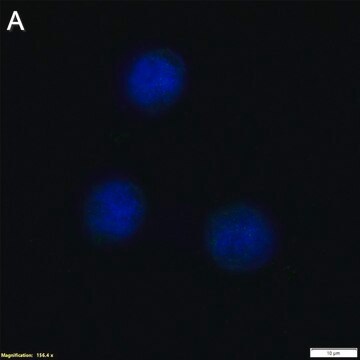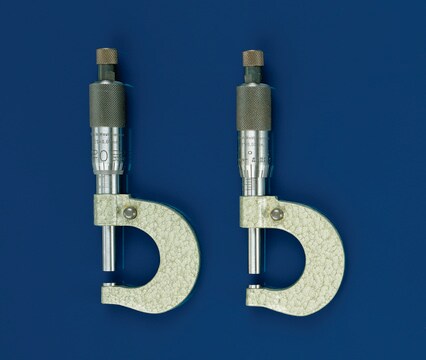07072001
ES-R1 from mouse
07072001, mouse embryo. Monolayer of spheroidal cells on feeder layer of PMEFs.
登录查看公司和协议定价
所有图片(1)
About This Item
分類程式碼代碼:
41106514
NACRES:
NA.81
生物源:
mouse embryo
增長模式:
Adherent
染色體組型:
Not specified
形態學:
Adherent monolayer of spheroidal cells on feeder layer of mouse primary embryonic fibroblasts
產品:
Not specified
受體:
Not specified
推荐产品
产品名称
ES-R1 from mouse,
生物源
mouse embryo
品質等級
形狀
liquid
增長模式
Adherent
染色體組型
Not specified
形態學
Adherent monolayer of spheroidal cells on feeder layer of mouse primary embryonic fibroblasts
產品
Not specified
受體
Not specified
技術
cell culture | mammalian: suitable
運輸包裝
dry ice
儲存溫度
−196°C
細胞系來源
Mouse embryonic stem cell
細胞系描述
Pluripotent mouse embryonic stem cell line. R1 ES cells were established in August 1991 from a male blastocyst hybrid of two 129 substrains (129X1/SvJ and 129S1/SV-+p+Tyr-c Kitl Sl-J/+).
培養基
MEF medium consists of Advanced DMEM/F12 (Invitrogen 12634010), 10% FBS (Perbio SH30070.03E), 2 mM Glutamine (Invitrogen 25030024) and 0.1 mM ß-mercaptoethanol (Sigma M6250).
KSR medium consists of KO-DMEM (Gibco 10829), 20% Knock-Out Serum Replacer (Gibco 10828), 2 mM Glutamine (Invitrogen 25030024), NEAA (Invitrogen 11140035), 0.1 mM ß-mercaptoethanol (Sigma M6250) and LIF 1000 Units/ml (ESGRO ESG1106).
KSR medium consists of KO-DMEM (Gibco 10829), 20% Knock-Out Serum Replacer (Gibco 10828), 2 mM Glutamine (Invitrogen 25030024), NEAA (Invitrogen 11140035), 0.1 mM ß-mercaptoethanol (Sigma M6250) and LIF 1000 Units/ml (ESGRO ESG1106).
例行更新培養
Embryonic stem (ES) cells require the use of mitotically inactivated feeder cells to support the growth of stem cells in the undifferentiated state. Mouse embryonic fibroblasts, STO (Sigma catalog no. 86032003) or SNL 76/7 (Sigma catalog no. 07032801) can be used. At ECACC plastic ware is pre-coated with gelatine prior to plating feeder cells.
Porcine gelatine (Sigma G1890) is dissolved in sterile water (0.5 g/500 ml) at 56 °C. The 0.1% solution is sterilized by filtration (0.22 μm). Add 0.1% gelatine to plastic ware to cover bottom, and incubate for 20 minutes at room temperature. Remove gelatine, wash with PBS once and replace with appropriate culture medium. The flask/dish must not be allowed to dry out.
Feeder layers are prepared on the gelatinized flasks at least 24 hours in advance of being required. An ampoule is thawed in 37 °C water bath and the contents quickly transferred to a 15 ml centrifuge tube. MEF medium is added drop wise to 5 ml. Cells are centrifuged at 150 x g for 5 minutes at room temperature (RT). Cells are resuspended in 5 ml of MEF medium. Cells are counted and added to flasks containing the correct medium at 1-3 x 104 cells/cm2.
An ampoule of ES cells is thawed in 37 °C water bath and the contents quickly transferred to a 15 ml centrifuge tube. KSR medium is added drop wise to 5 ml. Cells are centrifuged at 150 x g for 5 minutes. Cells are resuspended in 5 ml of KSR medium. The prepared feeder flask is washed once with PBS and KSR medium added. ES cells should be plated at 4-5 x 104 cells/cm2. Cultures must be incubated in a humidified 5% CO2/95% air incubator at 37 °C. A 100% media change must be performed every day and cells passaged every 2-3 days. Colonies must not be allowed to touch each other as overgrowth will result in differentiation.
Porcine gelatine (Sigma G1890) is dissolved in sterile water (0.5 g/500 ml) at 56 °C. The 0.1% solution is sterilized by filtration (0.22 μm). Add 0.1% gelatine to plastic ware to cover bottom, and incubate for 20 minutes at room temperature. Remove gelatine, wash with PBS once and replace with appropriate culture medium. The flask/dish must not be allowed to dry out.
Feeder layers are prepared on the gelatinized flasks at least 24 hours in advance of being required. An ampoule is thawed in 37 °C water bath and the contents quickly transferred to a 15 ml centrifuge tube. MEF medium is added drop wise to 5 ml. Cells are centrifuged at 150 x g for 5 minutes at room temperature (RT). Cells are resuspended in 5 ml of MEF medium. Cells are counted and added to flasks containing the correct medium at 1-3 x 104 cells/cm2.
An ampoule of ES cells is thawed in 37 °C water bath and the contents quickly transferred to a 15 ml centrifuge tube. KSR medium is added drop wise to 5 ml. Cells are centrifuged at 150 x g for 5 minutes. Cells are resuspended in 5 ml of KSR medium. The prepared feeder flask is washed once with PBS and KSR medium added. ES cells should be plated at 4-5 x 104 cells/cm2. Cultures must be incubated in a humidified 5% CO2/95% air incubator at 37 °C. A 100% media change must be performed every day and cells passaged every 2-3 days. Colonies must not be allowed to touch each other as overgrowth will result in differentiation.
其他說明
Additional freight & handling charges may be applicable for Asia-Pacific shipments. Please check with your local Customer Service representative for more information.
Cultures from HPA Culture Collections and supplied by Sigma are for research purposes only. Enquiries regarding the commercial use of a cell line are referred to the depositor of the cell line. Some cell lines have additional special release conditions such as the requirement for a material transfer agreement to be completed by the potential recipient prior to the supply of the cell line. Please view the Terms & Conditions of Supply for more information.
Depositor and originator: Dr A Nagy, Samuel Lunenfeld Research Institute, Mount Sinai Hospital, 600 University Ave, Toronto, Ontario, M5G 1X5, Canada.
儲存類別代碼
10 - Combustible liquids
水污染物質分類(WGK)
WGK 3
閃點(°F)
Not applicable
閃點(°C)
Not applicable
A Nagy et al.
Proceedings of the National Academy of Sciences of the United States of America, 90(18), 8424-8428 (1993-09-15)
Several newly generated mouse embryonic stem (ES) cell lines were tested for their ability to produce completely ES cell-derived mice at early passage numbers by ES cell <==> tetraploid embryo aggregation. One line, designated R1, produced live offspring which were
Anne Plück et al.
Methods in molecular biology (Clifton, N.J.), 561, 199-217 (2009-06-09)
Since the technique of introducing a targeted mutation ('gene targeting') into the mouse genome was published almost 20 years ago (Cell 51:503-512, 1987), the number of mouse mutants (mouse models) is increasing, especially after the advent of the full mouse
我们的科学家团队拥有各种研究领域经验,包括生命科学、材料科学、化学合成、色谱、分析及许多其他领域.
联系技术服务部门







